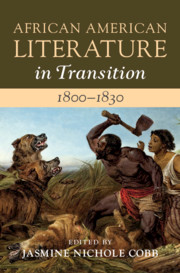Book contents
- African American Literature in Transition, 1800–1830
- African American Literature in Transition
- African American Literature in Transition, 1800–1830
- Copyright page
- Contents
- Figures
- Contributors
- Preface
- Chronology
- Introduction
- Part I Black Organizational Life before 1830
- Part II Movement and Mobility in African American Literature
- Part III Print Culture in Circulation
- Part IV Illustration and the Narrative Form
- Index
Part II - Movement and Mobility in African American Literature
Published online by Cambridge University Press: 11 March 2021
- African American Literature in Transition, 1800–1830
- African American Literature in Transition
- African American Literature in Transition, 1800–1830
- Copyright page
- Contents
- Figures
- Contributors
- Preface
- Chronology
- Introduction
- Part I Black Organizational Life before 1830
- Part II Movement and Mobility in African American Literature
- Part III Print Culture in Circulation
- Part IV Illustration and the Narrative Form
- Index
Summary
Scholars contributing to Part II advance our knowledge of the movements associated with Black people and Black texts. In the decades from 1800 to 1830, legal statutes and slave revolts impacted the mobility of African American people and the flows of Black literary texts. These decades are peculiar even as they are bookended by landmark decisions – namely the Fugitive Slave Act of 1793 and the Fugitive Slave Act of 1850. Both statutes emboldened slave owners and catchers to pursue fugitive free Blacks in northern states and border territories, thus endangering free-born people of African descent as well. President George Washington never stopped pursuing Ona Judge, who absconded from his home in 1796, on her own, and moved into Philadelphia’s community of free-born and fugitive free Blacks.1 Likewise, the second fugitive slave law only added to the danger Harriet Jacobs faced in freedom, remaining on the run in the North even as she began to contemplate publication in the 1850s.
- Type
- Chapter
- Information
- African American Literature in Transition, 1800–1830 , pp. 91 - 166Publisher: Cambridge University PressPrint publication year: 2021

